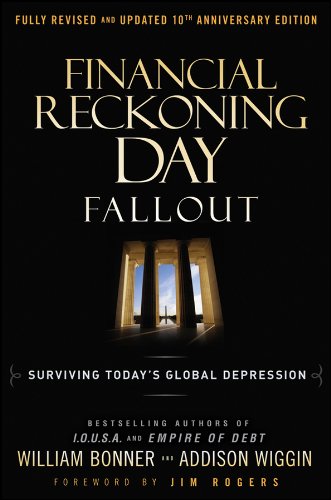Recently by Bill Bonner: The Absurdity of Central Planning
The subject is debt; it needs to go away.
Debt was the market’s bête noire, this week and last. In Europe, it snatched up the Irish and carried them off. Then it attacked the Portuguese. Everyone knew the periphery states were going broke. Their cost of borrowing soared. Then, when the search parties reached them, the Irish turned them away. Debt has it usefulness, the Irish figured. They held out until Wednesday, apparently negotiating terms of their own rescue.
In America, municipal debt collapsed by nearly 10% over the last two weeks. It became more and more obvious that state and local governments were headed for default too. California might get a bailout…but California, like Ireland, is a sovereign state. It could refuse. Borrowers worried that Californians and the Irish might prefer to default like honest incompetents rather than submit to the rescuers’ demands.
 Financial Reckoning Da...
Best Price: $2.36
Buy New $2.49
(as of 04:30 UTC - Details)
Financial Reckoning Da...
Best Price: $2.36
Buy New $2.49
(as of 04:30 UTC - Details)
Debt is underrated. For one thing, it is more reliable than asset values. The crisis of ’07–’09 wiped out about a third of the world’s equity and property wealth. And it disappeared 7 million jobs in America alone. But debt survived intact. In terms of the cash flow needed to support it, debt actually grew larger.
Central planners can make a recession appear to go away. With enough hot money, they might warm up asset prices or soothe the swelling unemployment rate. But debt doesn’t cooperate. Neither monetary policy nor fiscal policy will make it go away. Debt demands honesty. The debtor has to fess up, admitting that he is a fool or a knave. Either he owns up to his mistake and defaults…or he cheats.
“With all due respect, US policy is clueless,” said German Finance Minister Wolfgang Schauble. “It’s not that the Americans haven’t pumped enough liquidity into the market. Now to say let’s pump more into the market is not going to solve their problem.”
 The Monster: How a Gan...
Best Price: $1.99
Buy New $30.22
(as of 10:54 UTC - Details)
The Monster: How a Gan...
Best Price: $1.99
Buy New $30.22
(as of 10:54 UTC - Details)
The English speakers conveniently misunderstand the debt problem. The authorities worked hard not to see the debt crisis coming. They made their careers and reputations by not understanding it. Thousands of them work for governments and central banks…if they caught on to the problem now, they’d probably have to resign.
They pretend that the problem is a lack of “liquidity.” Or a failure of capitalism. Or that the regulators dropped the ball. It is none of those things. Each of those problems can be “solved.” Short liquidity? The feds can add some; as much as you want. Did capitalism lose its way? No problem again, the authorities will apply more central planning. Not enough regulation? Are you kidding; adding regulation is what they do best.
The real problem is debt. In Ireland, for example, investors, householders and bankers all lost their heads in the bubble era. Your editor bought a house in Ireland in 2006. He knew perfectly well it was overpriced. He had walked the streets of Dublin. He had seen storefronts offering property, not just in Dublin…but in Dubrovnik. He had heard people say that “property never goes down.”
 The New Empire of Debt...
Best Price: $1.03
Buy New $3.00
(as of 04:30 UTC - Details)
The New Empire of Debt...
Best Price: $1.03
Buy New $3.00
(as of 04:30 UTC - Details)
Now his house is worth about half what he paid for it – if he could find a buyer. There is no reason to expect that house to ever recover – at least in real terms – to the level it was 3 years ago. That wealth has disappeared. Along with it went the banks’ collateral and the value of the debt it backed. It is all dead. It is no more. It has ceased to be. It is past tense. But, rather than let the banks’ bondholders take the losses they deserved – in rushed the financial authorities with guarantees and more credit. Ireland’s deficit rose to a staggering 30% of GDP. Its national debt will rise from 100% of GDP to 120%.
Meanwhile, California is moving closer to bankruptcy – and borrowing more too. The state is $25 billion in the hole, with no plausible plan to get out. The Milken Institute says unfunded pension liabilities will rise to $10,000 per capita by 2013 – the equivalent of an extra $40,000 mortgage for every household. Like Ireland, California cannot pay the debts it has incurred. The federal government will offer a bailout…but with strings attached.
And soon, the bailers will be in trouble too. According to The Wall Street Journal, a combination of 15 major national governments will have to borrow a total of more than $10 trillion next year, to finance deficits and repay maturing bonds. That’s 27% of their total economic output. It also is equal to about twice the entire world’s annual savings.
The authorities warn about the risk of “contagion.” They sweat to “calm” the markets. But why bother? Debt of this magnitude cannot be repaid. It has gone bad. At least give it a decent burial.
November 20, 2010
Bill Bonner [send him mail] is the author, with Addison Wiggin, of Financial Reckoning Day: Surviving the Soft Depression of The 21st Century and The New Empire of Debt: The Rise Of An Epic Financial Crisis and the co-author with Lila Rajiva of Mobs, Messiahs and Markets (Wiley, 2007).




